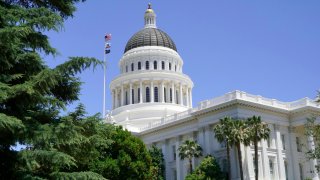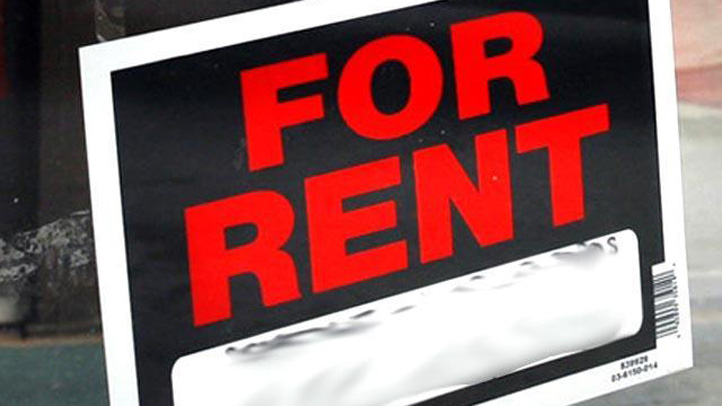
Californians unable to pay their rent because of the coronavirus crisis could have their payments covered by the state Legislature, Senate leaders announced Tuesday, part of a massive $25 billion aid package that looks to the future to pay for relief needed today.
California has been under a mandatory stay-at-home order since March 19, shuttering most of the state's economy and sending 4.5 million people to file for unemployment benefits. State and local officials have moved to delay evictions during the crisis, prompting concerns from landlords who could face foreclosure with no rent payments.
The Senate's solution to this is to give landlords tax credits equal to the value of their missed payments. Landlords could keep the credits, which would lower their state tax bills from 2024 through 2033, or they could sell them for cash.
Tenants would have 10 years to pay back their missed rents to the state, with some not having to pay the full amount because of an unspecified hardship exemption. The state would not charge interest.
Get a weekly recap of the latest San Francisco Bay Area housing news. Sign up for NBC Bay Area’s Housing Deconstructed newsletter.
The program would be voluntary, meaning both tenants and landlords must agree to it. If no tenants paid the money back, lawmakers estimate it would cost the state about $500 million.
“This is not a giveaway to anyone,” Democratic Sen. Steven Bradford said. “Our goal is to keep tenants housed and keep landlords out of foreclosure.”
California
California Apartment Association CEO Tom Bannon called the proposal a “creative effort,” but said he wants “to refine” the plan. He did not give details.
The proposal is the first significant coronavirus relief package from the state Senate, which returned to work this week after taking its first unscheduled work stoppage in 158 years. The virus has upended the legislative session, with lawmakers searching for ways to aid the state's economic recovery while facing an estimated $54.3 billion budget deficit of their own.
Monday offered the first draft of what a state aid package might look like. Senate leaders endorsed a $25 billion economic recovery fund that small businesses, nonprofits and local governments could tap to help weather the virus-induced downturn.
To get the money, lawmakers would entice taxpayers to pay their future taxes early in exchange for a discount. It's a tradeoff for the state. Lawmakers would get the money up front, which they could start spending sooner to help the economy recover. But beginning in 2024, state revenues would be $3 billion less each year for the next 10 years.
Legislative leaders believe the economic crisis will have passed and the state's normal annual operating budget of more than $200 billion could easily absorb the losses.
“The ultimate effect of course would enable taxpayers to invest in California to help California struggling through this very challenging crisis," Democratic Sen. Bob Hertzberg said.
Last week, Gov. Gavin Newsom projected the state's unemployment rate would hit 18%, or 46% higher than the height of the Great Recession a decade ago. With so many people out of work, state tax collections have dropped so much that Newsom is now projecting a budget deficit of $54.3 billion.
Newsom is scheduled to reveal his updated spending plan Thursday. On Tuesday, Senate President Pro Tempore Toni Atkins vowed the chamber would avoid major ongoing program cuts or broad middle class tax increases, saying those options work in the short-term but “actually cause more economic damage and prolong our budget struggles.”
Senate Budget Committee Chair Holly Mitchell, a Democrat from Los Angeles, said lawmakers have identified savings of nearly $95 billion over the next two years. About $41 billion would come from the state's reserves and other budget maneuvers that include internal borrowing and shifting some costs to future years.
The rest would come from the federal government, with lawmakers estimating they would get $33 billion from what they hope will be an upcoming aid package.
“I know that California is strong and we will meet this challenge,” Mitchell said.
But some Republicans were skeptical, with state Sen. John Moorlach calling the plan “a typical status quo response.”
“Smoke and mirrors has worked before, but it all comes home to roost,” he said.
Newsom and leaders from four other Western states signed a letter to Congress on Monday asking for $1 trillion in aid for state and local governments. But some Republican leaders have warned not to count on that money. Senate Republican Leader Shannon Grove, who represents Bakersfield, did not sign the letter asking Congress for the help.
“I could not support an effort that continues to allow our state government to run (amok) without protecting industries by streamlining burdensome government regulations, reforming unsustainable projects, and supporting private businesses which are California's vital economic engine,” she said.
For most people, the new coronavirus causes mild or moderate symptoms, such as fever and cough that clear up in two to three weeks. For some, especially older adults and people with existing health problems, it can cause more severe illness, including pneumonia and death.



